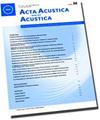利用横向飞行频散估算计算飞机噪声的地面子轨道建设
Q1 Arts and Humanities
引用次数: 1
摘要
在没有雷达数据等位置数据的情况下,飞机噪声计算通常依赖于根据飞行轨迹和飞行剖面数据定义的飞行几何形状。通常情况下,地面航迹被构造成一条主干航迹,其中有若干条子航迹用于计算横向飞行弥散。根据轨道的性质,例如,当考虑与非常狭窄的轨道相比较的发散轨道时,子轨道的数量需要能够计算平滑的噪声轮廓和足迹,从而对所需的最小子轨道数量提出要求。然而,在实践中,由于音轨需要由专家手工数字化,可用的子音轨数量往往有限。此外,子轨道的位置通常是未知的,需要估计走廊边界并将其转换为子轨道位置。本文提出了一种基于横向飞行频散估计来构建所需子轨道数的方法。设想了两种情况:第一种是使用一组预先存在的三条子轨道(一条主干路和左/右子轨道)来估计横向飞行分散,第二种是使用主干路和走廊边界来估计。该方法首先对原始航迹进行几何匹配,然后对局部横向航迹色散进行估计。横向分布函数然后用于建设新的子轨道。图中显示了一系列使用不同数目的支线的飞机噪音计算,显示支线数目对噪音轮廓线的影响,这取决于支线的性质(例如急转弯的情况)。本文章由计算机程序翻译,如有差异,请以英文原文为准。
Construction of Ground Subtracks for Aircraft Noise Calculations Using an Estimate of Lateral Flight Dispersion
In the absence of position data such as radar data, aircraft noise calculations usually rely on the definition of flight geometries in terms of flight track and flight profile data. Typically, the ground track is constructed as a backbone track with a number of subtracks accounting
for the lateral flight dispersion. Depending on the nature of the tracks, for instance when considering diverging tracks compared to very narrow tracks, the number of subtracks needs to be such that smooth noise contours and footprints are computed, putting a requirement on the minimum number
of subtracks needed. In practice however, as the tracks need to be digitized by expert hand, the number of available subtracks is often limited. Furthermore, the location of the subtracks is often unknown, requiring corridor boundaries to be estimated and to be translated into subtrack locations.
This paper presents a method for the construction of the required number of subtracks based on an estimate of lateral flight dispersion. Two cases are envisioned: the first being an estimate of the lateral flight dispersion using a set of three pre-existing subtracks (one backbone track and
left/right subtracks), the second being an estimate using a backbone track and corridor boundaries. The method uses geometric matching of the original tracks, followed by an estimation of the local lateral track dispersion. The lateral distribution function is then used for the construction
of new subtracks. A series of aircraft noise calculations using diff erent numbers of subtracks are shown, showcasing the influence of the number of subtracks on the noise contours, depending on the nature of the tracks (e.g.situations with tight turns).
求助全文
通过发布文献求助,成功后即可免费获取论文全文。
去求助
来源期刊
CiteScore
2.60
自引率
0.00%
发文量
0
审稿时长
6.8 months
期刊介绍:
Cessation. Acta Acustica united with Acustica (Acta Acust united Ac), was published together with the European Acoustics Association (EAA). It was an international, peer-reviewed journal on acoustics. It published original articles on all subjects in the field of acoustics, such as
• General Linear Acoustics, • Nonlinear Acoustics, Macrosonics, • Aeroacoustics, • Atmospheric Sound, • Underwater Sound, • Ultrasonics, • Physical Acoustics, • Structural Acoustics, • Noise Control, • Active Control, • Environmental Noise, • Building Acoustics, • Room Acoustics, • Acoustic Materials and Metamaterials, • Audio Signal Processing and Transducers, • Computational and Numerical Acoustics, • Hearing, Audiology and Psychoacoustics, • Speech,
• Musical Acoustics, • Virtual Acoustics, • Auditory Quality of Systems, • Animal Bioacoustics, • History of Acoustics.

 求助内容:
求助内容: 应助结果提醒方式:
应助结果提醒方式:


